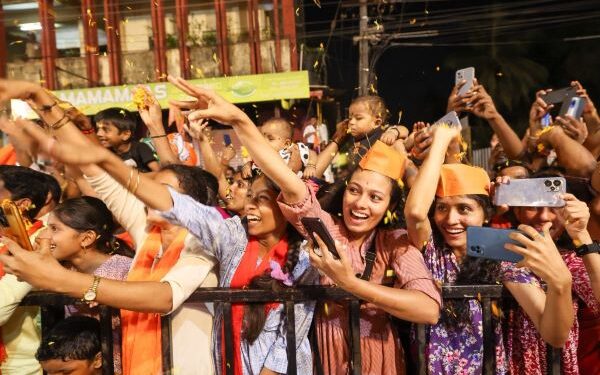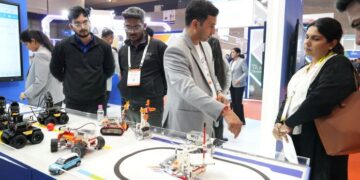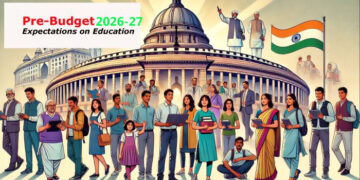Education, styled and labelled in many ways, has been very much part of the Indian civilization and continues to occupy a central space in modern India’s societal culture. In fact, education has in a way shaped every walk of life in independent India and helped it hugely to register an impressive economic growth, provided a gateway to social justice and empowerment by universalizing the power of education and given the country its share of ordinary heroes in every field of knowledge and its applications.
That said, India’s education system, the cornerstone of nation’s social and economic development as it should be, remains one of the critical areas of Government intervention, policy improvement and importantly funding. So, when the country is seeing one of the fervent elections around this time and fielding of ideas and mind games to choose a new national government, education narrative must be also won—is prompting all political parties to sell hard their promises. However, when other catchy and controversial issues having a ‘street talk’ appeal consume most of time and space in electioneering, issues of education can be still found in manifestoes. These documents provide important insights into the thinking of politicians and a clue to future agendas of these parties on education. Therefore, it is a good idea to know how education is run its future course under the new Government through these pointers.
The BJP and the Congress, the two main rival national political parties, in a way are in a direct contest with each other through their alliances. Having released their manifestoes, they have a contrasting approach to education barring their similar commitments to cleanse the public examination system for jobs and environment conservation. The contrast on education makes it interesting to know how these parties look at education and its related issues besides offering a peep intos their thinking on bettering the ecosystems of education. It is pertinent to mention that both the parties have used youth as the main category to address education but gone completely different way in projecting their roadmap.
What Does Congress Party say on Education?
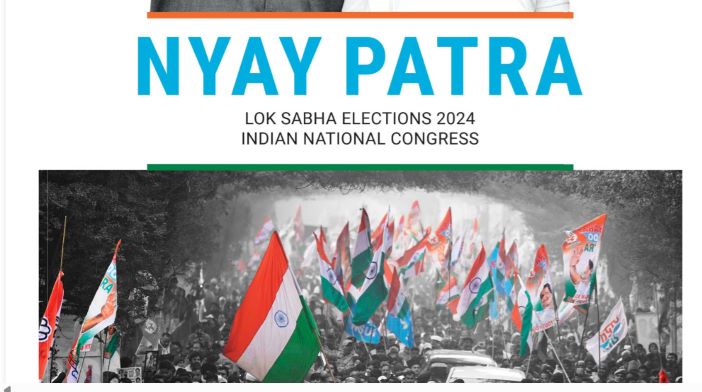
Congress manifesto on education reads like a memorandum handed over by agitating students, associations and unions of various stakeholders to higher authorities while knowing fully that it is more of a ritual and rhetoric. More than a long-term and illustrative systemic view and reform, the party priority seems to be to politicize various current and past issues to arouse passions and garner votes on populist promises. So, its Yuva Nyay programme (to be implemented on war footing as per the manifesto) overemphasizes on social diversity and is a clear ploy to woo the SC/ ST/OBC and minorities. In this ‘divisive’ affirmative list of promises, the party has used discontent to win voters with ‘redressal’ election promises.
The party has said, it will establish a network of residential schools for the poor, especially SC and ST students, and extend them to every block. Establishing Ambedkar Bhavans-cum-Libraries in every district to promote the habit of reading and discussion, doubling the number of scholarships for SC and ST students to pursue a Ph.D, enacting the Rohith Vemula Act to address discrimination faced by students belonging to the backward and oppressed communities in educational institutions, implementing the recommendations of the Renke Commission and restoring the Maulana Azad Scholarships for study abroad and increase the number of scholarships are some of the key promises made in the manifesto of the party.
It has also made an attempt to fan emotions on ‘hijab’ issue and said, “Congress will ensure that, like every citizen, minorities have the freedom of choice of dress, food, language and personal laws.” It has amplified the so-called ‘discrimination’ against the Muslims and stated that the party will ensure that the minorities receive their fair share of opportunities in education, healthcare, public employment, public works contracts, skill development, sports and cultural activities without discrimination.
At the same time, the party election manifesto of the grand old party does offer some promising ideas on reforming the education that includes taking DMK line on NEET. Its manifesto says:
- Congress guarantees a new Right to Apprenticeship Act to provide a one-year apprenticeship with a private or a public sector company to every diploma holder or college graduate below the age of 25. Apprentices will get 1 lakh a year.
- Will revisit the policy of centrally-conducted qualifying examinations such as NEET, CUET, etc. And make it optional for state governments to adopt these examinations for admissions or conduct their own examinations meeting the prescribed standards to state-funded and state-approved higher educational institutions.
- Will amend the RTE Act to make education from Class I to Class XII in public schools compulsory and free.
- Will revisit and amend the NEP in consultation with the state governments.
- Will end the practice of charging special fees for different purposes in public schools.
- Will encourage state governments to establish fee regulation committees.
- will assist state governments to establish one Government Community College in every tehsil/taluk for students completing Class XII. These community colleges will offer a broad range of degrees/diplomas suitable for jobs in the service industry (e.g. hospitality, tourism, digital marketing, paramedical, paralegal, etc.) and for jobs in the manufacturing industry that require basic technical skills.
Congress party, which has been vocal on the issue of unemployment has promised to establish a Diversity Commission that will measure, monitor and promote diversity in public and private employment and education. Promising 10% EWS reservation, abolishing of Agnipath programme in favor of old Armed forces recruitment scheme and publishing a job calendar for each department, institution and public body with details of vacancies and the timelines to fill the vacancies, the Congress promises to fill the nearly 30 lakh vacancies in sanctioned posts at various levels in the central government made in the manifesto. Some other related promises are:
- Appoint a second ASHA worker in all villages with a population exceeding 2,500 persons.
- Double the number of Anganwadi workers and create an additional 14 lakh jobs.
- Create a new employment-linked incentive (ELI) Scheme for corporates to win tax credits for additional hiring against regular, quality jobs.
- Launch a strategic mining programme to explore and mine rare earths and critical minerals with the object of increasing the share of mining to 5 per cent of GDP and creating 1.5 crore jobs for unskilled and skilled workers in the mineral-rich states.
- We will launch an urban employment programme guaranteeing work for the urban poor in reconstruction and renewal of urban infrastructure.
- Provide jobs for low-education, low-skilled youth by launching a Water Bodies Restoration Programme and a Wasteland Regeneration Programme that will be implemented through village panchayats and municipalities.
- Establish an autonomous non-profit society involving the state governments, universities and business organisations to establish at least one Skills Training Institute in each district to impart skills through short- and long-term courses to youth in the age group of 18-29 years. Incentivise corporates to use CSR funds for skill training in recognised skill training institutes.
What Does the BJP say on Education in its manifesto?
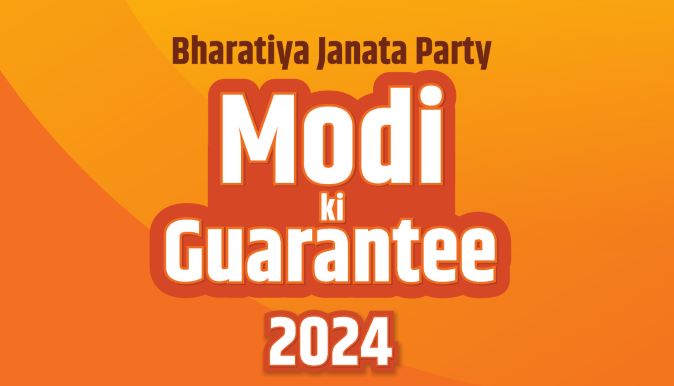
The BJP definitely rides in a different plane so far as education is concerned. In contrast to Congress, which has focused more on ‘the weaker’ sections, BJP has a holistic approach contextualized in the backdrop of a roadmap to achieving its Viksit Bhart 2047 vision and it being confident of NEP 2020 as the propelling vehicle for aligning education and skilling ecosystems with it.
“Our vision is to redefine the education ecosystem by envisioning modern, universalised, quality education propelled by the momentum of NEP 2020. We will prepare our students to be future ready through a dynamic curriculum process. We will encourage teaching and learning in mother tongue. We will focus on all dimensions of quality education including teachers training, infrastructure, use of technology, internships, and time-to-time upgradation of knowledge and skills,” says the BJP.
The BJP has taken an idealistic approach and is banking on the new order of ‘skillized’ education having a clear emphasis on fostering entrepreneurships to address the issue of jobs, which can potentially overcome the desperation in jobs supply/demand of the past. Young citizens form an essential pillar of our commitment towards building a Viksit Bharat. Our vision is to build a Viksit Bharat where young citizens can fully realise their potential. ‘Mera Yuva Bharat (MY Bharat)’ a program already running to involve the youth in nation building is seen a way to develop leadership skills and spirit of volunteering by the youth in this mission. “The nation’s growth has been fueled by the achievements of our youth who have not only dared to dream big but also worked to realise dreams in various domains such as space, sports and start-ups. In the last ten years, whether it is education, employment or entrepreneurship, crores of new opportunities have been created for our youth,” says the Party manifesto.
The Party says it will develop an integrated education framework under the NEP, to ensure young citizens have the opportunity to earn while they learn. “We guarantee high-quality education, world-class sports facilities, employment and entrepreneurial opportunities to all young citizens through the NEP and other programmes,” it writes in its Sankalp Patra.
The major election promises made in the manifesto:
Ensuring Quality School Education
We will ensure that every student gets the opportunity for high-quality school education. For this, we will strengthen the network of PM SHRI Schools, Ekalavya Schools and other such schools as per NEP to make them world-class. We will work towards a 100% Gross Enrollment Ratio from pre-school to secondary level. Ensuring Future-Ready Youth We will make our youth future ready by adopting a dynamic learning curriculum at school level as mandated by NEP and by incorporating industry-aligned curriculum and skill development in emerging technologies in higher education.
Implementing One Nation, One Student ID
We will achieve 100% implementation of ‘One Nation, One Student ID’ through the Automated Permanent Academic Account Registry (APAAR) to store academic qualifications, credit scores and certificates, among others for students from pre-primary to higher education. Expanding Skills Training for Youth In the last ten years, we have developed a robust skill development ecosystem. In line with the objectives of NEP, we will further enhance it and integrate it with our education system. We will continue to work with industry to expand skilling opportunities that lead to employment and self-employment.
Establishing New Institutions of Higher Learning
7 IITs, 16 IIITs, 7 IIMs, 15 AIIMS, 315 Medical Colleges and 390 universities have been set-up in the past decade. We are committed to strengthening these institutes and further increasing the number of institutions of higher learning. We will continue to upgrade the existing institutions through focused funding, capacity building, infrastructure upgradation and dedicated research grants.
Using Technology for Access to Quality Education
We will promote the usage of education stack for personalised and flexible learning management systems through initiatives under PM e-Vidya such as SWAYAM, SWAYAM PRABHA, etc. Building on the success of the above digital learning initiatives, we will operationalize a digital university for industry-focused free courses to provide upskilling opportunities for low-income families.
The entrepreneurship, manufacturing and new frontiers are other prominent items to convey party’s engagement with the youth. The Party has said it will set up an Anusandhan Fund with an investment of ₹1 lakh crore to provide loans to promote scientific research.
Promoting the Entrepreneurial Spirit
We will expand credit programmes like Mudra to support all aspiring entrepreneurs in starting and sustaining their ventures. The Mudra loan limit will be doubled up to ₹20 lakh and provided to entrepreneurs who have availed and successfully repaid previous loans under the Tarun category.
Expanding the Startup Ecosystem
We have successfully established Bharat among the top 3 Startup Ecosystems through various interventions ranging from Atal Tinkering Labs, Hackathon, Startup India and Start Up India Seed Fund Scheme. We will build upon this success and expand this ecosystem by making Bharat a preferred destination for startups, supported by robust investment, mentorship and a culture that celebrates entrepreneurial risk-taking. We will work with the private sector to expand the incubator network and link them with higher education institutes to promote entrepreneurship among our students.
Expand Funding for Startups
We will expand the existing Startup India Seed Fund Scheme and Startup Credit Guarantee Scheme to ensure adequate funds for our start-ups in their entrepreneurial journeys.
Providing Mentorship to Startups
We have successfully provided mentorship under the Atal Innovation Mission where more than 6,000 mentors are already present. We will continue establishing tie-ups with globally recognised mentors to support the startups in their journeys to success.
Encouraging Startups in Government Procurement
We have taken initiatives in many departments including defence and railways to support procurement from startups. We will prepare a strong framework to further encourage startups in government procurement.
Increasing Employment Opportunities in Manufacturing
With PLI and Make in India programmes, manufacturing has emerged as a major economic sector with good success in electronics, defence, mobile, automobile, etc. We will continue to work towards making Bharat a global manufacturing hub and enhance employment in this crucial sector. Employment Generation Through Investment in Infrastructure Unprecedented investment in infrastructure has created a large number of employment opportunities. We will continue this investment for employment growth.
Establishing Global Centres for High-Value Services
We will further strengthen our efforts to make Bharat the global hub for High-Value Services by establishing more Global Capability Centres (GCCs), Global Tech Centres (GTCs) and Global Engineering Centres (GECs).
Providing New Employment Opportunities in Tourism
Our rich cultural heritage is the centre of global attraction. Our efforts at improving connectivity, building better infrastructure and reaching out to the world has significantly increased tourist footfall. We will expand the range of programmes to further expand the tourism sector and increase employment opportunities..
Catalysing AI Innovation for Global Leadership
We will develop a comprehensive ecosystem under the IndiaAI mission, driving AI innovation through collaborative strategic programs and partnerships to position Bharat as a global leader in AI innovation and build domestic capacities to ensure tech sovereignty.
Graphene Mission
We will strengthen the Graphene-based technology programmes to develop more use cases and applications.
Quantum Tech Frontier
We will operationalise the National Quantum Mission to position Bharat as a global leader in quantum technology, harnessing its potential to revolutionise various sectors and spearhead technological innovation.
Achieving Geospatial Data Excellence
We will create a national geospatial data registry and geospatial data exchange that will enable industries and startups for innovative products and services.
Establishing Science Parks
We will establish science parks in various cities, to ensure that the spirit of scientific inquiry is within reach of Bharat’s youth. We will launch a National Atmospheric Mission to be called Mausam to make Bharat “weather ready” and “climate smart”.
The party has also made assertion that India will launch Gaganyaan, Bharat’s first human spaceflight mission, and land an astronaut on the Moon, a sign of Bharat’s progress and prosperity in Amrit Kaal. We will establish Bharatiya Antariksha Station (BAS) and we will also operationalise a second launch complex for the country. We aim to significantly increase the value of the Space Economy, positioning Bharat as a leading space power and extending support to Global South countries in utilising space and space technology services.
We will set up a Global Space Academy under the aegis of ISRO and IIST with fellowship programmes for both national and international students. We will also establish a spaceforum that positions Bharat as a leading space power and assist Global South countries in using space and space-tech services.
PM Vishwakarma Yojana
For the first time since independence, the BJP-led Government initiated a specially designed programme for the upliftment of Vishwakarma families. Under this programme, providing financial assistance, credit facilities, training and skill development, and providing market access to Vishwakarma families is being introduced. The party said, it will further strengthen Bharat’s Vishwakarmas through a series of such initiatives.
Empowering Small Traders and MSMEs to adopt ONDC and expand their businesses using the power of technology, creating a suite of public cybersecurity products to help small traders and MSMEs protect themselves against the cyber threats and frauds, expanding the network of Dak Ghar Niryat Kendras to provide easy export facility to MSMEs, Small Traders, and Vishwakarma Families. and launch of affordable insurance products for small traders and MSMEs to protect them from accidents like fire, theft, natural disasters etc. are promises made to small businesses.
“We will modernise traditional crafts by facilitating design interventions by collaborating with design skill institutes and setting up a Handicraft Design Bank to upskill traditional artisans, opening doors to global market opportunities and transforming their craft into sustainable livelihood,” says the manifesto. The party has also listed transforming Bharat into the global hub for toy manufacturing, leveraging our skilled workforce and rich cultural heritage to produce innovative and high-quality toys.


